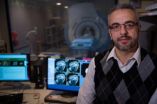(Press-News.org) A doctor-patient relationship built on trust and empathy doesn't just put patients at ease – it actually changes the brain's response to stress and increases pain tolerance, according to new findings from a Michigan State University research team.
Medical researchers have shown in recent studies that doctors who listen carefully have happier patients with better health outcomes, but the underlying mechanism was unknown, said Issidoros Sarinopoulos, professor of radiology at MSU.
"This is the first study that has looked at the patient-centered relationship from a neurobiological point of view," said Sarinopoulos, the lead researcher. "It's important for doctors and others who advocate this type of relationship with the patient to show that there is a biological basis."
The study involved randomly assigning patients to one of two types of interview with a doctor before undergoing an MRI scan. In the patient-centered approach, doctors addressed any concerns participants had about the procedure and asked open-ended questions allowing them to talk freely about their jobs, home life and other psychological and social factors affecting health. The other patients were asked only specific questions about clinical information such as their medical history and what drugs they were taking.
As expected, those who had the patient-focused interview reported greater satisfaction and confidence in their doctor in a post interview questionnaire.
The participants then were placed in the MRI scanner and given a series of mild electric shocks, similar to the discomfort of having an IV needle inserted, while looking at a photo of a doctor who they were told was supervising the procedure. The scans measured activity in the anterior insula – the part of the brain that makes people aware of pain – in anticipation of the shocks and when they actually occurred.
The brain scans revealed those who had the patient-centered interview showed less activity in the anterior insula when they were looking at a photo of the interviewing doctor than when the doctor in the photo was unknown. Those participants also self-reported less pain when the photos showed the known doctor.
Sarinopoulos said the study had a small sample of just nine women and will need to be replicated on a larger scale.
"We need to do more research to understand this mechanism," he said, "but this is a good first step that puts some scientific weight behind the case for empathizing with patients, getting to know them and building trust."
Published in the journal Patient Education and Counseling, the study was part of a broader effort at MSU, led by professor of medicine Robert Smith, to establish standards for patient-centered health care and measure its effectiveness.
"Medicine has for too long focused just on the physical dimensions of the patient," said Smith, who co-authored the paper. "Those clinical questions are important and necessary, but we're trying to demonstrate that when you let patients tell their story in an unfettered way, you get more satisfied patients who end up healthier."
INFORMATION:
Michigan State University has been working to advance the common good in uncommon ways for more than 150 years. One of the top research universities in the world, MSU focuses its vast resources on creating solutions to some of the world's most pressing challenges, while providing life-changing opportunities to a diverse and inclusive academic community through more than 200 programs of study in 17 degree-granting colleges.
For MSU news on the Web, go to msutoday.msu.edu. Follow MSU News on Twitter at twitter.com/MSUnews.
Listen up, doc: Empathy raises patients' pain tolerance
2012-12-04
ELSE PRESS RELEASES FROM THIS DATE:
Women with sleep apnea have higher degree of brain damage than men, UCLA study shows
2012-12-04
Women suffering from sleep apnea have, on the whole, a higher degree of brain damage than men with the disorder, according to a first-of-its-kind study conducted by researchers at the UCLA School of Nursing. The findings are reported in the December issue of the peer-reviewed journal SLEEP.
Obstructive sleep apnea is a serious disorder that occurs when a person's breathing is repeatedly interrupted during sleep, sometimes hundreds of times. Each time, the oxygen level in the blood drops, eventually resulting in damage to many cells in the body. If left untreated, it ...
Mercury releases contaminate ocean fish: Dartmouth-led effort publishes major findings
2012-12-04
In new research published in a special issue of the journal Environmental Health Perspectives and in "Sources to Seafood: Mercury Pollution in the Marine Environment"— a companion report by the Dartmouth-led Coastal and Marine Mercury Ecosystem Research Collaborative (C-MERC), scientists report that mercury released into the air and then deposited into oceans contaminates seafood commonly eaten by people in the U.S. and globally.
Over the past century, mercury pollution in the surface ocean has more than doubled, as a result of past and present human activities such ...
Baby's health is tied to mother's value for family
2012-12-04
The value that an expectant mother places on family—regardless of the reality of her own family situation—predicts the birthweight of her baby and whether the child will develop asthma symptoms three years later, according to new research from USC.
The findings suggest that one's culture is a resource that can provide tangible physical health benefits.
"We know that social support has profound health implications; yet, in this case, this is more a story of beliefs than of actual family support," said Cleopatra Abdou, assistant professor at the USC Davis School of Gerontology.
Abdou ...
University of Minnesota researchers find new target for Alzheimer's drug development
2012-12-04
MINNEAPOLIS/ST. PAUL (December 3, 2012) – Researchers at the University of Minnesota's Center for Drug Design have developed a synthetic compound that, in a mouse model, successfully prevents the neurodegeneration associated with Alzheimer's disease.
In the pre-clinical study, researchers Robert Vince, Ph.D.; Swati More, Ph.D.; and Ashish Vartak, Ph.D., of the University's Center for Drug Design, found evidence that a lab-made compound known as psi-GSH enables the brain to use its own protective enzyme system, called glyoxalase, against the Alzheimer's disease process. ...
Western University researchers make breakthrough in arthritis research
2012-12-04
Researchers at Western University have made a breakthrough that could lead to a better understanding of a common form of arthritis that, until now, has eluded scientists.
According to The Arthritis Society, the second most common form of arthritis after osteoarthritis is "diffuse idiopathic skeletal hyperostosis" or DISH. It affects between six and 12 percent of North Americans, usually people older than 50. DISH is classified as a form of degenerative arthritis and is characterized by the formation of excessive mineral deposits along the sides of the vertebrae in the ...
New Jamaica butterfly species emphasizes need for biodiversity research
2012-12-04
GAINESVILLE, Fla. — University of Florida scientists have co-authored a study describing a new Lepidoptera species found in Jamaica's last remaining wilderness.
Belonging to the family of skipper butterflies, the new genus and species is the first butterfly discovered in Jamaica since 1995. Scientists hope the native butterfly will encourage conservation of the country's last wilderness where it was discovered: the Cockpit Country. The study appearing in today's Tropical Lepidoptera Research, a bi-annual print journal, underscores the need for further biodiversity research ...
Managing care and competition
2012-12-04
Medicare Advantage (MA), with more than 10 million enrollees, is the largest alternative to traditional Medicare. MA's managed care approach was designed to provide coordinated, integrated care for patients and savings for taxpayers, but since the program launched as Medicare Part C in 1985, critics have said that the system limited enrollee freedom of choice without significant benefit or savings to the Medicare program. They also pointed to the tendency of some private payers to design benefit plans and marketing campaigns that attracted healthier patients, leaving sicker, ...
New study shows probiotics help fish grow up faster and healthier
2012-12-04
BALTIMORE, MD (December 3, 2012)— Probiotics like those found in yogurt are not only good for people--they are also good for fish. A new study by scientists at the Institute of Marine and Environmental Technology found that feeding probiotics to baby zebrafish accelerated their development and increased their chances of survival into adulthood.
This research could help increase the success of raising rare ornamental fish to adulthood. It also has implications for aquaculture, since accelerating the development of fish larvae--the toughest time for survival--could mean ...
Ames Laboratory scientists develop indium-free organic light-emitting diodes
2012-12-04
Scientists at the U.S. Department of Energy's (DOE) Ames Laboratory have discovered new ways of using a well-known polymer in organic light emitting diodes (OLEDs), which could eliminate the need for an increasingly problematic and breakable metal-oxide used in screen displays in computers, televisions, and cell phones.
The metal-oxide, indium tin oxide (ITO), is a transparent conductor used as the anode for flat screen displays, and has been the standard for decades. Due to indium's limited supply, increasing cost and the increasing demand for its use in screen and lighting ...
Declining air pollution levels continue to improve life expectancy in US
2012-12-04
Boston, MA -- A new study led by researchers at Harvard School of Public Health (HSPH) has found an association between reductions in fine particulate matter and improved life expectancy in 545 counties in the U.S. from 2000 to 2007. It is the largest study to date to find beneficial effects to public health of continuing to reduce air pollution levels in the U.S.
The study appears in the December 3, 2012 online edition of the journal Epidemiology.
"Despite the fact that the U.S. population as a whole is exposed to much lower levels of air pollution than 30 years ago—because ...




